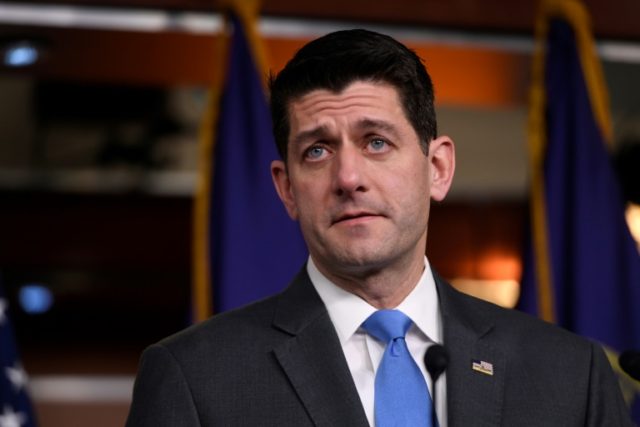Washington (United States) (AFP) – Paul Ryan entered Congress as a wonkish, budget-slashing young conservative and will leave 20 years later atop the Republican heap, an outgoing speaker of the House with possibly grander political ambitions ahead.
Thirty months into a thankless job he never truly wanted, the Wisconsin native announced Wednesday he will not seek re-election in November, as he wanted to spend more time with his family, including three teenage children.
Ryan told rank-and-file members of his party that he will retire at the end of his term in early January, setting up a frenzied leadership scramble.
“You realize that you hold the office for just a small part of our history, so you better make the most of it,” he said. “It’s fleeting, and that inspires you to do big things.”
Ryan led the fractious House through the end of the Barack Obama administration and into a political maelstrom: the 2016 campaign and the unlikely presidency of Donald Trump.
It is the most important job in Congress and one that has placed him second in line to the presidency, after the vice president, should the commander-in-chief be impeached or otherwise vacate the Oval Office.
Ryan’s ambition from the start was to slash spending and eliminate the deficit, repeal the health care reforms known as Obamacare, and address his longterm goals of privatizing the Social Security pension system and Medicare public health service for seniors — both American sacred cows for more than half a century.
In the end, his signature accomplishment will be the massive tax cut bill that he and Trump managed to push through Congress.
Elevated in 2015 as a GOP peacemaker who might somehow reconcile the moderate and conservative wings of the party, Ryan’s efforts at maintaining an even keel under a roiling surface has proved exhausting.
“I can imagine after herding those cats that long, you get tired,” said Republican Senator Lindsey Graham.
– ‘Individualism vs collectivism’ –
Ryan’s meteoric rise took him from House staffer to one of the “young gun” lawmakers in the late 1990s, to the 2012 vice presidential nomination, and ultimately speaker of the House.
Bookish and occasionally cocky, he is an ideologue influenced by neoclassical thinkers and repelled by what he sees as the excesses of modern federal government.
“The fight we are in here — make no mistake about it — is a fight of individualism versus collectivism,” Ryan said in a 2005 speech to devotees of laissez-faire capitalist philosopher Ayn Rand, according to The New Yorker.
But over his two decades in Congress, Ryan has gradually earned a reputation of “Mr. Budget” among his Republican colleagues — or “Mr. Austerity,” according to Democrats.
He was the lawmaker with sufficient potential for Mitt Romney to choose him to be his running mate in the 2012 White House race, stressing at the time that “with energy and vision, Paul Ryan has become an intellectual leader of the Republican Party.”
– Home boy –
Paul Davis Ryan was born on January 29, 1970 in the small town of Janesville, in the midwestern state of Wisconsin, where his Irish-Catholic family has lived for five generations.
He still lives in the neighborhood where he grew up and returns from Washington every weekend to his wife Janna and their three children.
In high school he became president of his class, winning his first-ever election.
In 1988 he headed to Miami University of Ohio, where he nurtured his passion for economic theory and politics. When he volunteered for a congressional campaign as a student, it was ironically for Ohio’s John Boehner — the man he replaced as House speaker.
From 1992 to 1997, Ryan worked for a Republican senator in Washington and for Empower America, the organization founded by the influential conservative Jack Kemp, who took him under his wing.
Ryan returned to Wisconsin, where he easily won election to the US House in 1998 at the ripe age of 28.
He quickly earned a reputation in conservative circles, and rose to become chair of the powerful House Budget Committee.
Ryan was thrust into the national spotlight when Romney put him on the ticket in 2012.
His biggest challenge after becoming speaker was helming the tumultuous Republicans through the November 2016 election and beyond.
But he had difficulty aligning with Trump when the billionaire New York businessman won the nomination, and pointedly declined to campaign with him after a tape surfaced on which Trump could be heard boasting about groping women.
Ultimately the two men made peace, although Ryan bristled over Trump threats of a trade war with China, and has opposed the president’s efforts to oust Robert Mueller as a special counsel investigating Russian interference in the US election.
Prior to Trump’s victory, Ryan was seen as a likely frontrunner for the Republican presidential nomination in 2020.
Leaving Congress might free him to plot his political future.

COMMENTS
Please let us know if you're having issues with commenting.